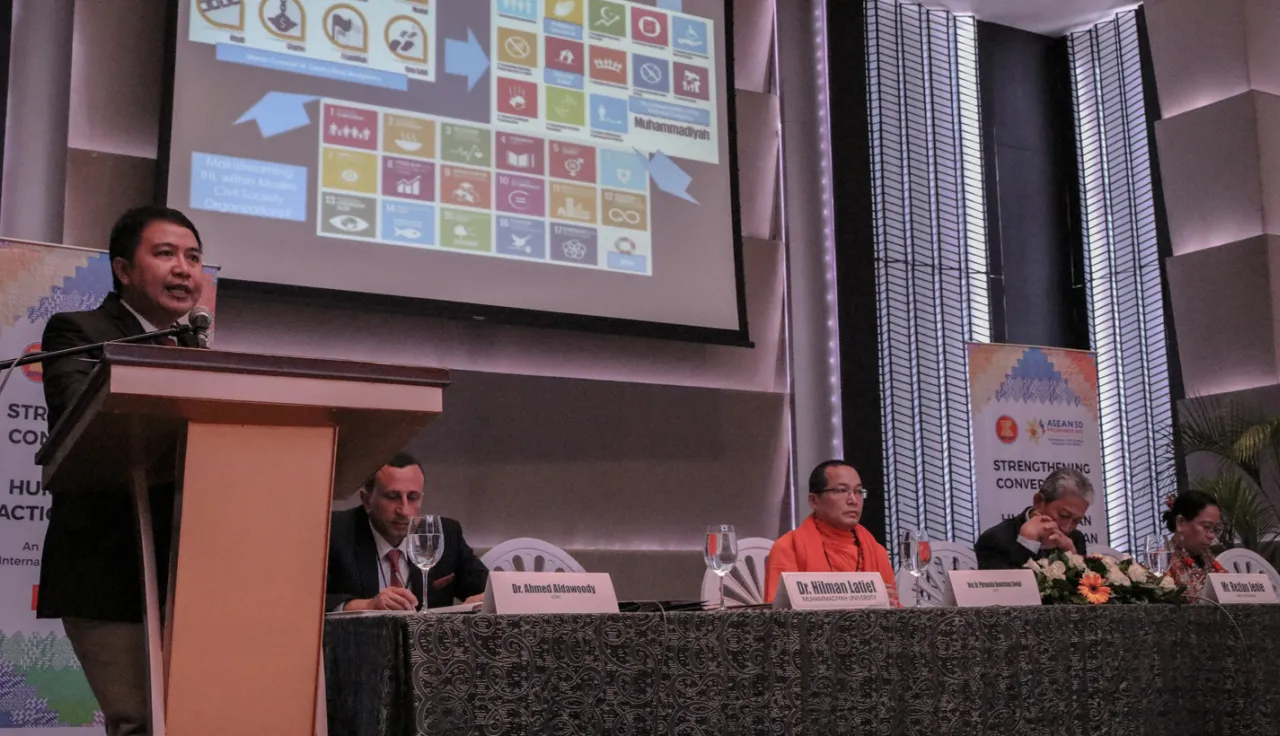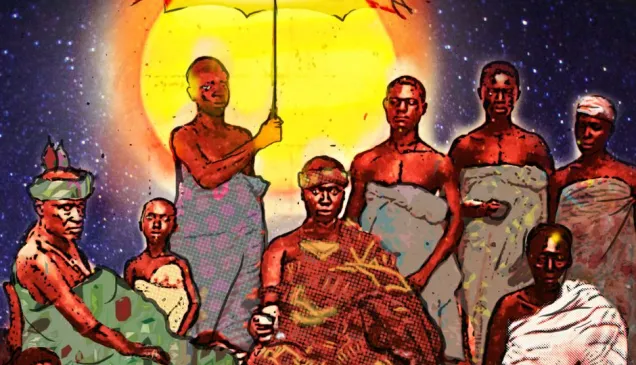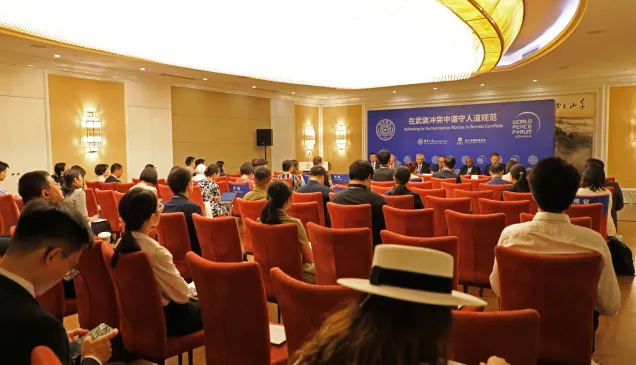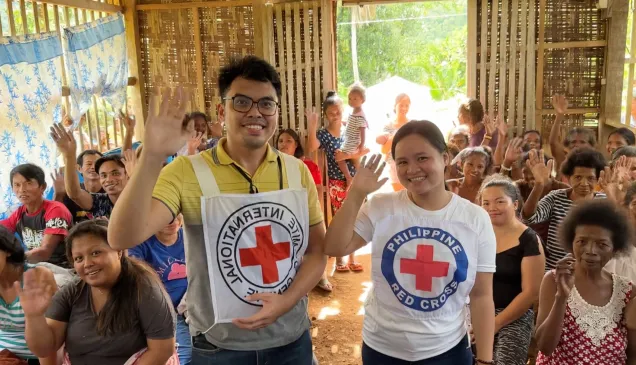Strengthening convergences for humanitarian action in Southeast Asia

The ASEAN Institute for Peace and Reconciliation (AIPR), together with the Philippines Office of the Presidential Adviser on the Peace Process (OPAPP) and the ICRC, held a symposium entitled "Strengthening Convergences for Humanitarian Action: An AIPR Symposium on International Humanitarian Law" on 2-3 October 2017 in Manila, Philippines with the support of the Governments of Norway and Switzerland.
The symposium gathered members of ASEAN AIPR Governing Council and Advisory Board, Ambassadors of ASEAN member states, ASEANAPOL, NGOs, UN agencies, international organizations, think-tanks, universities, religious organizations, community leaders and representatives of the International Red Cross and Red Crescent Movement. The participants explored the convergences of international humanitarian law, humanitarian principles, religious norms and customary practices in order to address specific humanitarian and protection challenges within ASEAN.

CC BY-NC-ND / ICRC
Speakers and moderators from Indonesia included Ambassador Rezlan Jenie, executive director of the AIPR, Dr Hilman Latief, vice-rector of Muhammadiyah Yogyakarta University, Dr Rahmwati Husein, vice-chair at Muhammadiyah Disaster Management Center and Najelaa Shihab, founder and head of school, Sekolah Cikal and Rumah Main Cikal.
Read on as Mr Christoph Sutter, head of the ICRC regional delegation to Indonesia and Timor Leste in Jakarta, answers questions regarding the ICRC's approach in the region and cooperation with ASEAN on humanitarian affairs.
Why did the ICRC and OPAPP combine efforts to support the AIPR?
With the volatile and changing polarization of the world today, coupled with the ever-increasing challenges, there is a greater need to partner to address humanitarian assistance and protection challenges and ensure respect for humanitarian law in the region and beyond. Assisting and protecting people in a better way in the current humanitarian crises requires humanitarian cooperation at the operational, prevention and diplomatic levels.
ASEAN is a natural partner of great interest for the ICRC as with its experience and wisdom of 50 years the regional organization is well placed to support peace in the global fora, to use its influence and experience – notably in humanitarian assistance and disaster relief – and to encourage international and regional efforts to reduce consequences from humanitarian crises, whether they are natural or human-induced disasters. ASEAN nations and people are rich in humanitarian spirit, have plenty of experience, expertise and capacity in crisis management of all kinds, and have the ambition and capacity to care for all of their communities.
In this framework, the regional conference provided a relevant avenue to share experience and best practices with present organizations and practitioners engaged in humanitarian action and diplomacy.
What are the ICRC's expectations from its exchanges with ASEAN?
The ICRC regards ASEAN as not only a major regional power but also an important global actor, which can add its weight to the promotion of humanitarian values, the reduction of humanitarian and protection challenges in ASEAN and other regions and the promotion of the culture of prevention.
From the ICRC perspective, ASEAN could use greater influence to ensure the promotion and respect for humanitarian norms among States.
The world will become a better place as ASEAN will increasingly use its influence to ensure the promotion and respect of humanitarian norms among States, including IHL in the region and in other places where people are suffering the horrors of war.
How would you define the ICRC's relationship with ASEAN, which though a strategic and economic power, faces humanitarian needs due to crisis such as in Rakhine State?
The interaction between ASEAN and the ICRC has developed over recent years, touching upon various humanitarian issues of common interest in a constructive manner. This symposium in 2017 represented a landmark as it was the first joint project between the ICRC and ASEAN. Also, it took place in conjunction with the commemoration of the 50th anniversary of ASEAN, a milestone representing the organization's half-century of success in maintaining peace and stability in the region. The event was considered very timely, given that it provided a platform for ASEAN to discuss humanitarian issues and its possible interventions in a context like Rakhine State, building on its recent experiences in Marawi, South Philippines. The ICRC is confident that the relationship will keep developing, and looks forward to enhancing its bilateral dialogue and consolidating its partnership with ASEAN and Member States.
What did you find particularly interesting during the event?
Overall, it was very inspiring to feel the spirit of the ASEAN family and the determination to move forward while respecting the principles of consensus and non-interference. For the ICRC, it was great to witness the official launch of the AIPR with the announcement of Ambassador Rezlan Jenie from Indonesia as its first executive director. This new institution will definitely play a key role in dealing with humanitarian challenges and promoting the culture of prevention in the region in order to achieve reconciliation when needed, and ultimately to maintain peace.
Senator Richard Gordon, chairman of the Philippine Red Cross, also provided us with inspiring messages on the importance of adhering to the principle of humanity in any humanitarian intervention. He also spoke about the key role played by the International Red Cross and Red Crescent Movement during urgent and complex crisis, and overall, on the significance of humanitarian diplomacy with relevant agencies, including with various components of governments and humanitarian networks to address the causes of humanitarian crisis in a timely manner.
What are the key outcomes of this event and how will this benefit the ICRC's work in the region?
A set of best practices and recommendations identified during the event will be used as a reference point to further reflect and act collectively to better address humanitarian and protection challenges in and outside the region, and to further build a culture of prevention that could inspire other regions.
The event was an important milestone as it showed that there are new opportunities to discuss important but still sensitive issues related to protection needs in ASEAN. Such positive humanitarian dialogue at regional level will complement the bilateral dialogues that the ICRC delegations have in ASEAN countries and 80 countries all over the world.
Beyond the all-too-frequent and disturbing news of hatred, violence and conflict in our world today, the symposium gathered religious leaders, academics, humanitarian workers, legal and law enforcement officers, ASEAN officials, diplomats, health-care providers, educators and other segments of civil society, all determined to not become overwhelmed by the many complex and brutal faces of war and conflict, but to uplift human dignity and the provision of humanitarian assistance to every human life, particularly that of the vulnerable.
It is also our hope that the ASEAN leaders and policymakers who were present at the event can now build on those discussions with their respective authorities and stakeholders to enhance assistance and protection in ASEAN and beyond.



